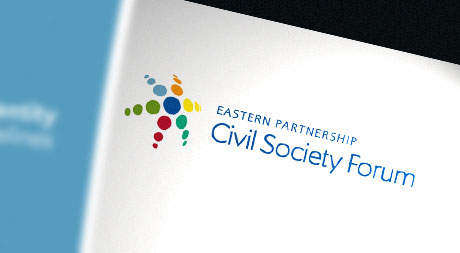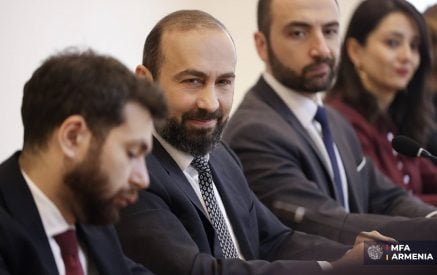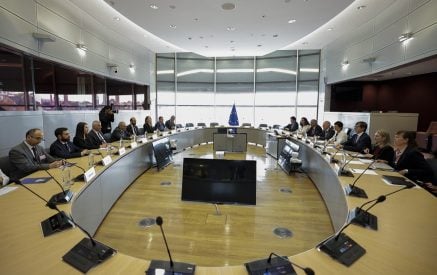With the new European Parliament settling in and the discussions on the new Commission following suit, the EU’s management of its foreign relations and its financing – will be affected by internal changes. If the EU wants to remain a credible actor in the countries covered by the EU’s Eastern Partnership Policy – Armenia, Azerbaijan, Belarus, Georgia, Moldova and Ukraine – it must re-commit to the support of the democratic development of these countries, says Eastern Partnership Civil Society Forum (EaP CSF). Based on the results of consultations carried out among member organisations, EaP CSF proposed 23 ideas on how the new EaP policy after 2020 can be improved through changes in three areas.
In the paper “Advancing Eastern Partnership: 23 civil Society Ideas for the policy beyond 2020”, EaP CSF argues that the policy for the region beyond 2020 must be modelled around a renewed and strengthened cooperation between the EU and democratically-minded constituencies, who can support the EU in the formulation, implementation and assessment of democratic reforms. The new partnership document after 2020 should be more balanced and include all societal actors of EaP region equally into the reform processes.
“The construction of a democratic society has to be a process shared by many actors. Leaving the formulation and implementation of democratic reforms to the sole responsibility of EaP governments, – the same often responsible for human rights violations and cherry-picking reforms – sets it up for failure. To avoid this, the EU should make democratic reforms a first priority and include civil society of EaP countries as a third and equal player in policy design, implementation and evaluation, pushing for EaP governments’ acceptance of a heightened status for civil society.”– says Natalia Yerashevich, Director of the Secretariat of the Eastern Partnership Civil Society Forum.
If the EU wants to preserve strategic partnership with EaP region, which is increasingly affected by competition of influence of different state models, as we see today in Moldova, it should not shy away from addressing existing contradictions in democratic reforms. Strengthening democratic reforms, especially rule of law and fighting corruption in Armenia, Azerbaijan, Belarus, Georgia, Moldova and Ukraine and moving away from carrots and sticks logic, should remain high on the political agenda of the EU. Civil Society experts see this as the only way to secure long-term, sustainable and irreversible change in the region and avoid an imbalanced relationship of dependency, which leads to a lack of ownership by the partner countries.
Read also
What is more, the new EU institutions should become more vocal on formulating problems beyond the rule of law. The new Roadmap for EaP should be based on tangible steps such as cancelling roaming charges, reducing bank transfer fees for remittances, developing infrastructure projects, and supporting start-ups, cross-border e-payments or digital partnerships. Moreover, protection of the environment and climate change adaptation are the key issues for future. EaP region is lagging behind in this policy area and the legislation and implementation of environmental standards should become more prominent. The new European Parliament, with its stronger composition of Green Partiers, should pay attention to this aspect.
EaP CSF also alerts the Commission to keep the financial instrument dedicated to the region (ENI) and corresponding DG (currently DG NEAR) to avoid the risk of decreasing the relevance and visibility of EaP policy at times when developments in the neighbourhood are one of the crucial factors of EU internal politics.
The policy paper of EaP CSF offers civil society assessment of the Eastern Partnership policy after ten years of implementation as well as recommendations for beyond 2020. It is a key product of the EaP CSF 10 years’ anniversary campaign. It is based on collective input of the EaP CSF members and experts. Structured consultations at the level of EaP CSF National Platforms as well as with EaP CSF EU members were conducted in order to generate ideas presented in the paper. A total of 73 experts took part in the focus groups and online consultation.
About the Eastern Partnership Civil Society Forum
The Eastern Partnership Civil Society Forum (EaP CSF) is a unique multi-layered regional civil society platform aimed at promoting European integration, facilitating reforms and democratic transformations in the six Eastern Partnership countries – Armenia, Azerbaijan, Belarus, Georgia, Moldova and Ukraine. Serving as the civil society and people-to-people dimension of the Eastern Partnership, the EaP CSF strives to strengthen civil society in the region, boost pluralism in public discourse and policy making by promoting participatory democracy and fundamental freedoms. EaP CSF is a non-profit, non-government, non-partisan civil society organization. For more information, please visit the EaP CSF website at www.eap-csf.eu


























































